BENJAMIN BUTCHER
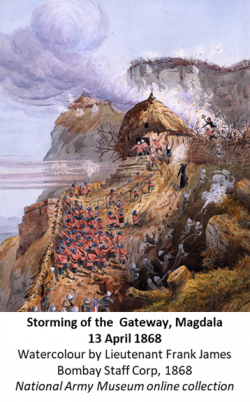 Subject Name : Benjamin Butcher (b 1835 – d 1923)
Subject Name : Benjamin Butcher (b 1835 – d 1923)
Researcher : Margaret Rose
Benjamin Butcher had a long list of black marks against his name during his time in the British Army but was involved in a successful campaign in Abyssinia that saw him and his regiment return to England as heroes.
Benjamin was born around 1835 in Compton, near Farnham, Surrey, the second child of Charles, a labourer, and Eliza Butcher nee Turner. He was baptised on 14th June that year at Compton’s St Nicholas Church, where his parents had married five years earlier.
The family continued to live in Compton, and by the time of the 1841 Census six-year-old 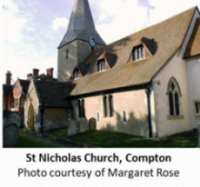 Benjamin had two sisters and a brother – Annersley (9), Harriett (3) and Charles (6 months). Father Charles was a 34-year-old agricultural labourer born in Ashington, Sussex, while mother Eliza, 30, was born at Tongham and baptised at Seale, about 5 miles (8 km) from Compton.
Benjamin had two sisters and a brother – Annersley (9), Harriett (3) and Charles (6 months). Father Charles was a 34-year-old agricultural labourer born in Ashington, Sussex, while mother Eliza, 30, was born at Tongham and baptised at Seale, about 5 miles (8 km) from Compton.
The family were still in Compton ten years later, with Benjamin, 16, now a labourer like his 45-year-old father. Mother Eliza, 44, had had three 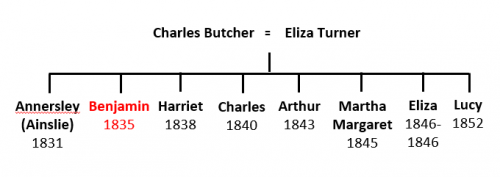 more children – Arthur in 1843, Martha Margaret in 1845, and Eliza, born in 1846, who passed away just two months later. One further child, Lucy, completed the family in 1852.
more children – Arthur in 1843, Martha Margaret in 1845, and Eliza, born in 1846, who passed away just two months later. One further child, Lucy, completed the family in 1852.
Nothing is known about the nature of Benjamin’s work as a labourer nor where he was 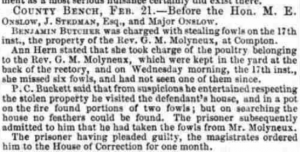 employed, but in February 1857, he was arrested for stealing six fowl from the St Nicholas Church’s Reverend GM Molyneux, who had baptised Benjamin over 21 years earlier. At the trial in Guildford later that month, the policeman told the County Bench that following the theft, he had gone to Benjamin’s house and found two of the fowl cooking in a pot whereupon Benjamin confessed to his crime. He was sentenced to one month in Surrey’s House of Correction, otherwise known as Wandsworth Gaol.
employed, but in February 1857, he was arrested for stealing six fowl from the St Nicholas Church’s Reverend GM Molyneux, who had baptised Benjamin over 21 years earlier. At the trial in Guildford later that month, the policeman told the County Bench that following the theft, he had gone to Benjamin’s house and found two of the fowl cooking in a pot whereupon Benjamin confessed to his crime. He was sentenced to one month in Surrey’s House of Correction, otherwise known as Wandsworth Gaol.
It appears that Benjamin was in trouble again a few months later, when he was convicted of  stealing a tame rabbit in September in Woking. Tried under the name of ‘Thomas Goddard’, he was sentenced in October to three more months hard labour in Wandsworth Gaol.
stealing a tame rabbit in September in Woking. Tried under the name of ‘Thomas Goddard’, he was sentenced in October to three more months hard labour in Wandsworth Gaol.
A few weeks after his release, Benjamin, age about 23, attested in London on 20th February 1858 as a Private in the Duke of Wellington’s 33rd Regiment of Foot. He clearly did not tell the truth about his age, which he gave as 18 years 9 months. At that time, the 33rd Regiment was desperately in need of new recruits, having lost over 530 men in the Crimean War 1854-1856, and then had become involved in the Indian Rebellion from May 1857, so maybe they were grateful for Benjamin’s services, whatever his age.
The 33rd Regiment were already in India stationed around Bombay, now known as Mumbai, and within about six months, Benjamin had joined the regiment there. Fortunately for Benjamin, the Indian Rebellion came to an end on 1st November 1858 although the ramifications from the atrocities committed by both sides were to last for many years. The 33rd Regiment would remain in India for another nine years to help keep the peace, but unfortunately, Benjamin seemed at times to wage his own private war amongst his colleagues. On the 17th February 1859, just three days before he had completed a year’s service, Benjamin was imprisoned for over three months for ‘striking a NC (non-commissioned) officer’.
Benjamin served short prison sentences twice more in 1864 and then again in January 1866 for unspecified offences before in April that year he was tried and convicted for ‘breaking out of barracks’. This led to over three more months in gaol for Benjamin, and he served yet more time in early 1867 for another offence.
By this time, the 33rd Regiment’s time in India was drawing to a close, but instead of returning home, they were instructed by the British Government to sail to Abyssinia, where a number of British subjects were being held hostage by Emperor Tewodros (Theodore) II at the capital Magdala, now known as Amba Mariam in Ethiopia, situated on a mountain plateau.
The 33rd Regiment left Kurrachee (Karachi) on 25th October 1867, heading for Zulla, Annesley Bay, now part of Eritrea, on the Red Sea. Even during this time while at sea, Benjamin stepped out of line again, being imprisoned for the seventh time in his Army career on the 8th November for three days.
Benjamin’s regiment arrived in Abyssinia on 1st December 1867, among the first of the 12,000 British and Indian troops 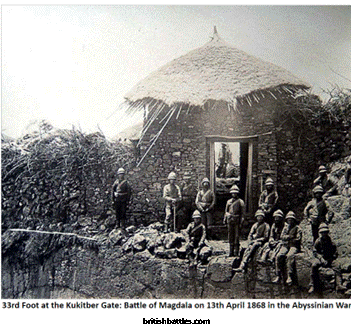 to set foot there. They were given the seemingly impossible task of preparing a road to Magdala, some 400 miles (640km) inland.
to set foot there. They were given the seemingly impossible task of preparing a road to Magdala, some 400 miles (640km) inland.
The incredible obstacles of trying to forge a way through the mountainous terrain for this rescue mission attracted the attention of New York Herald’s British journalist Henry Morton Stanley, who gained worldwide fame three years later when he found explorer David Livingstone in Ujiji. Stanley accompanied the force, led by Lt-Gen Sir Robert Napier, which took just four months to complete the journey to Magdala. They brushed aside any resistance from the Emperor’s ill-equipped soldiers and upon reaching Magdala, the British and Indian forces attacked on 9th April 1868. They routed the opposition in just five days and rescued all the hostages, while Emperor Tewodros died, probably by suicide.
This was acclaimed as a great victory, with Benjamin’s 33rd Regiment now able to return home to England. On 21st June 1868, the Royal Navy steamship ‘HMS Crocodile’, carrying the 33rd Regiment, steamed into Portsmouth harbour where, according to newspaper reports, ‘thousands of people lined the beach, ramparts and other places…People on shore shouted and waved handkerchiefs,  others in waterman’s wherries stood up and cheered and waved’.
others in waterman’s wherries stood up and cheered and waved’.
Benjamin and his regiment were among about 14,000 servicemen to receive the Abyssinian War Medal for their contribution to the campaign.
The 33rd Regiment, having spent so much time overseas, were based at home for the rest of Benjamin’s tenure in the Army which came to an end in Aldershot on 21st November 1877 because of ‘debility, the result of old age and long service, especially in India and active service in Abyssinia’. His record noted that his debility was partially due to ‘habits intemperate’. Benjamin had twice been imprisoned for drunkenness and twice more for unstated offences in his nine years since returning to England.
In all, Benjamin’s record stated that he was ‘58 times entered in the Regimental Defaulter’s Book including 4 times tried by Courts Martial’. He never once received a good conduct medal throughout his 18 years 242 days of service, although it did say, rather generously perhaps, that his conduct had been ‘fair’.
Benjamin’s record said that he was going to live in Ash, near Aldershot. where his mother Eliza had been living since at least 1871. Despite his debility, it was noted that he would be a labourer ‘able to contribute towards earning a livelihood’. He was stated as 38 years 5 months old – still at least four years less than his true age – and stood 5 feet 5 ½ inches (1.66m) tall with a fresh complexion, grey eyes and brown hair.
So did Benjamin follow this path? It is possible, but less than four years later, in 1881 he was an ‘inmate’ in the Guildford Union workhouse, age 43, with his occupation being an agricultural labourer. His 73-year-old widowed mother Eliza was still in Ash.
There are no records to indicate when or why Benjamin had entered the Guildford Union Workhouse, but he was not shown to be there when the 1891 Census was taken. In fact, he has not been traced at all on that Census, but as his mother passed away in Ash age 82 just a few days after the Census was taken, it is possible he was travelling there at that time.
Benjamin was back in the Guildford Union by 1895, and was still displaying his old feisty temperament. On 11th May 1895, the Workhouse Master produced his Punishment Book at the Guildford Union Board of Guardians Meeting, reporting that ‘on the 10th instant he punished Benjamin Butcher and Henry Green for fighting in the Ward, by giving each inmate 8oz (250g) bread only for dinner’. The board confirmed the action of the Workhouse Master.
On 24th October 1896 Benjamin was given a further punishment, this time of 48 hours reduced diet, following ‘insolence to the Master and attempting to strike the Porter and Labour Master and for refusing to go into a ward when requested to do so’.
The 1901 Census showed he was still an inmate in the Guildford Union, a 67-year-old unmarried pauper, working as a farm labourer. Still his behaviour was causing some concern, as on 7th January 1905, age about 70, he was punished for damaging the waistcoat of the Workhouse Porter.
There are no further incidents noted against Benjamin’s name, with the 1911 Census still having him as an inmate, age 70 sic and ‘formerly’ a farm labourer.
Ten years later, he was in the Farnham Infirmary, then part of the Farnham Workhouse. This Census has a number of probable errors, putting him as age 98 rather than 88, and as a widower. However, as it gives his birthplace as Compton, it appears to be that this was Benjamin from the Guildford Union.
Benjamin returned to the Guildford Union, where he passed away on 12th January 1923 age 90, from ‘senility’.
Much is not known about Benjamin, especially after him having to leave the Army in 1877. Army life clearly had taken a lot out of him and may well have contributed to him spending at least half his life in the Workhouse – a heavy price to pay for his moment of glory.
December 2022, updated April 2023
Sources
Ancestry.co.uk
Britishbattles.com
Findmypast.co.uk / British Newspaper Archive
General Register Office gro.gov.uk
Imperial War Museum iwm.org.uk
National Army Museum nam.ac.uk
Surrey History Centre, Woking Surreycc.gov.uk
Sussex Family History Group sfhg.org
Wikipedia.org
Workhouses.org.uk
For a full list of references click here
